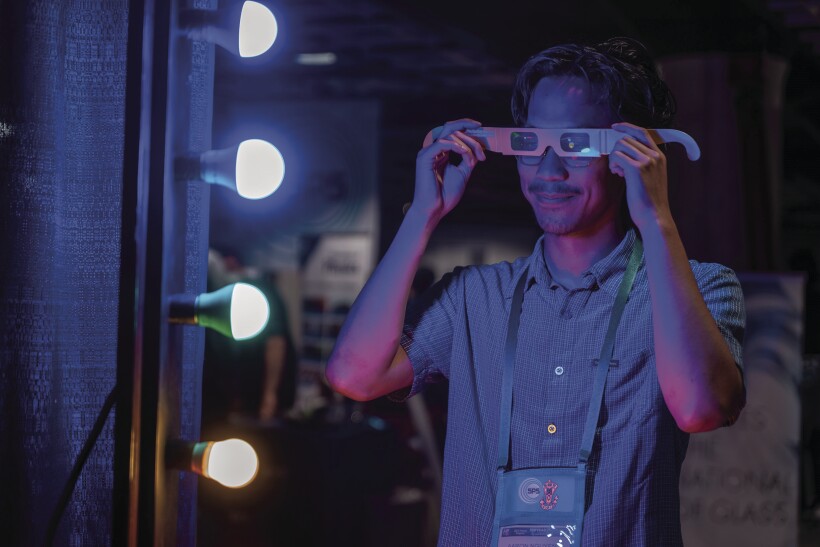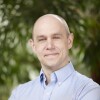Your Support Makes a Lasting Impact

Students from Rhodes College’s SPS chapter bond at the 2022 Physics Congress.
Thanks to the generous donations of Sigma Pi Sigma members and friends of SPS, undergraduates from more than 75 universities received financial assistance to attend the 2022 Physics Congress last October in Washington, DC. Without your critical support, many would have missed this transformative event.
The Physics Congress, hosted by Sigma Pi Sigma, gave these students and hundreds more a unique—and fun—collective opportunity for personal and professional growth. The event brought together more than 1,000 physics and astronomy students from 257 colleges and universities. At least 60 students came as the only student from their school, making new friends and lifelong connections along the way.
Throughout 2022, Sigma Pi Sigma supported students from another 25 departments as they traveled to meetings of AIP Federation Member Societies and Affiliates, and funded 18 regional meetings for undergraduate physics and astronomy students.
Travel Support Matters

A student checks out the effects of diffraction glasses in the 2022 Physics Congress Exhibit Hall.
Physics and astronomy departments are small when compared to most other majors—in 2022, departments in the United States averaged just six to seven undergraduates per year. As an undergraduate I knew that there were physics majors at other schools, but it was an abstract concept. How would I ever meet them? My first meeting—a combined SPS Zone 2 and New York Section of the American Physical Society meeting—changed the course of my life professionally and personally. It helped me figure out that I needed to try graduate school and that I belonged in this community. It got me interested in a variety of topics unrelated to my undergraduate research. It opened many doors for me. I’m eternally grateful to those who made it possible for me to attend: my SPS advisor John Andersen and those who donated to my department. I’m proud that Sigma Pi Sigma helps so many students achieve this milestone every year.
Presenting research results at a conference is one of the most important professional development activities we can offer students as they prepare for future careers. Effectively and succinctly communicating with peers and future colleagues is a skill that will benefit students for a lifetime. And through these experiences, students often gain insight into how their research connects to that of other groups or entire fields of study of which they were unaware. Science that occurs in a vacuum runs the risk of failing to advance the field and our shared understanding of the universe. For many, attending meetings illustrates what it means to be part of the scientific community in ways that a classroom cannot.
SPS Awards For Travel

Plenary speakers Renee Horton (left) and Julianne Pollard-Larkin (right) enjoy the 2022 Physics Congress.
Support that helps undergraduate students become active members of the physical science community speaks to the heart of the society. Since its inception at Davidson College in 1921, Sigma Pi Sigma has encouraged excellence within the field and the fellowship that comes from gathering with colleagues. These ideals live on through our support of undergraduate travel to conferences. Today, SPS is proud to offer three types of Sigma Pi Sigma–supported travel assistance to students:
- Travel Awards support undergraduates presenting their scholarly work at regional, national, or international conferences of AIP Federation Member Societies and Affiliates.
- Chapter Reporter Awards support undergraduates or groups of undergraduates attending national conferences. After concluding their trip, recipients write about their experiences for an SPS or Sigma Pi Sigma publication.
- Research Reporter Awards support undergraduates traveling to conduct research at a national laboratory, international laboratory, or observatory.
These awards are possible because of the generosity of Sigma Pi Sigma members and friends of the Society of Physics Students.
Sigma Pi Sigma also supports regional meetings across North America, called SPS zone meetings. Zone meetings offer many of the same opportunities as national or international conferences but on a smaller scale and with an undergraduate focus. Registration and lodging are typically inexpensive, increasing accessibility. And by presenting research at a regional meeting, students can meet local potential collaborators, employers, and graduate schools, and make new friends they’re likely to encounter again and again. They can also hone their communication skills in a less intimidating environment than a national or international meeting.
Looking to the Future

Rush Holt, a former congressman and SPS chapter advisor, gives a plenary talk during the 2022 Physics Congress. All photos by SPS.
This year will bring many more meetings and students in need of travel support. And looking further ahead, Sigma Pi Sigma and the 2025 Executive Program Committee are already well on their way to planning the 2025 Physics Congress, which will take place October 30–November 1 in downtown Denver, Colorado. We’re anticipating more than 1,300 attendees for three days of professional development and networking with plenary speakers Jocelyn Bell Burnell (University of Oxford), Donnell Walton (Corning Inc.), Eric Cornell (University of Colorado Boulder and JILA), and Julianne Pollard-Larkin (MD Anderson Cancer Center).
This event only happens every few years, and we want as many students as possible to be part of the action! But some simply cannot afford to attend PhysCon, or other physics and astronomy meetings, without a helping hand. As the Sigma Pi Sigma community, we can be that helping hand. We can give students the opportunity to make connections that will last a lifetime by contributing to the Annual Fund and the Congress Centennial Endowment Fund at foundation.aip.org
Linked but distinct, the societies of Sigma Pi Sigma and SPS are volunteer driven and donor supported. With your help we can ensure that future generations have experiences that mirror the comments of the students featured here. We each have a part to play in making the community more accessible and welcoming, and I invite you to join us in supporting the next generation and the next 100 years of Sigma Pi Sigma.
“As a first-generation college student, I am learning as I go. The college experience has been amazing for me. There is so much to learn, and I am excited to have the honor of being taught under incredible faculty and through my friends. Upon earning my bachelor’s degree in applied physics and mathematics, I would like to start working in a research laboratory while also pursuing a master’s degree in physics. I also have an interest in continuing on to earn a PhD. Thank you for believing in me.”
- Matthew, an SPS member who received a donor-supported scholarship and travel award
“I am a junior pursuing a degree in physics education, with the intent of teaching high school physics. I want to convey to my students the importance of physics in life, as well as how fun it can be! I also want to teach my students how to advocate for themselves and hopefully inspire some of them to pursue physics and engineering as a career.”
- Katie, an SPS member who received a donor-supported SPS award




